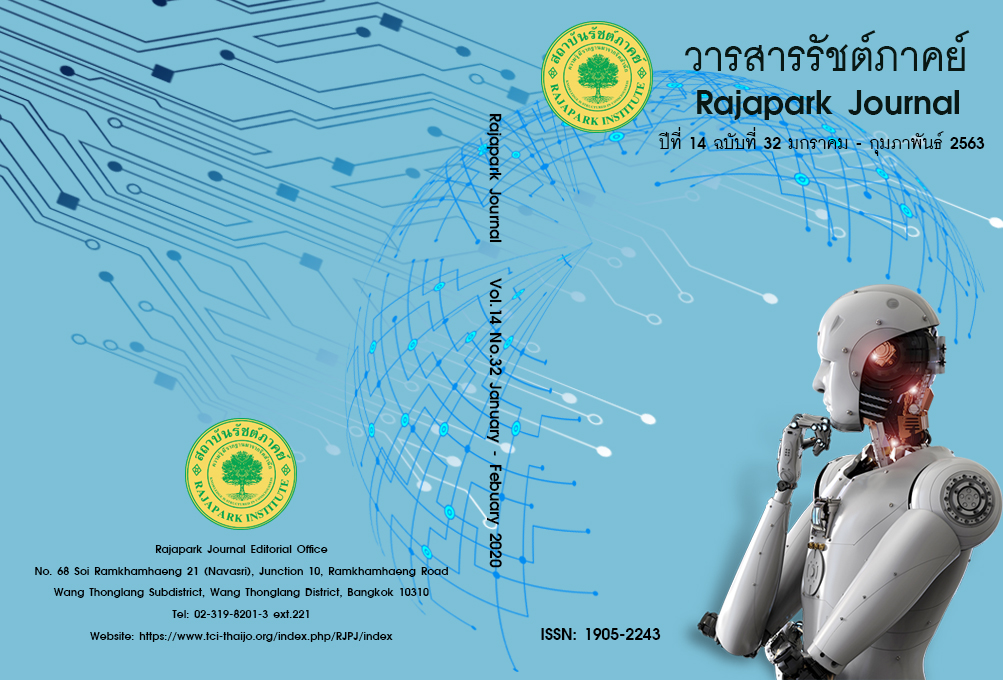Potential development for community business entrepreneurs: Lert-Ubon community business in Saimai District, Bangkok
Main Article Content
Abstract
This research aimed to study circumstances of business operation, environmental factors including obstacles affecting the business performance of the Lert-Ubon village’s community business in Saimai district, Bangkok. SWOT analysis technique was used to analyze internal and external factors. After that, all of the data were considered to develop the guidelines for developing business potentiality. The pilot project for enhancing business potentiality was employed and the outcomes were determined. The research design was participatory action research. The targets of this study were community business groups consisting of fabric product business group and cosmetic business group. 13 key informants were encompassing the chairman of Lert-Ubon community village, the leader and the members of the fabric product business group as well as the leader and the members of the cosmetic business group. The data were collected through in-depth interviews and focus groups. The findings revealed that both community business groups had encountered marketing problems particularly limited distribution channels and lack of promotion together with inefficient production management. However, the strengths that had been supporting factors to maintain business operation were the active and energetic character of the community business’s entrepreneurs for development, the talent and creativity in product development, and the concern on product quality. These strengths helped the Lert-Ubon village community business maintain the existing customer base. The pilot project regarding IT and online media workshop was handled for expanded distribution channel and marketing communication. The results showed the positive outcomes in the way that the products of both community business groups had gained more attention together with increasing purchase orders. Besides, there is the guideline of business potential development for community business in other areas to achieve business sustainability.
Article Details
Views and opinions appearing in the Journal it is the responsibility of the author of the article, and does not constitute the view and responsibility of the editorial team.
References
Azam, M. (2015). Diffusion of ICT and SME performance. E-Services Adoption: Processes by Firms in Developing Nations. Advances in Business Marketing and Purchasing, 23(A), Emerald Group Publishing Limited, 7-290. https://doi.org/10.1108/S1069-096420150000023005
Bangmo, S. (2012). Entrepreneurship. Bangkok: S.K. Book.
Chumjit, A., Chatchakul, N., & Chatchakul, K. (2014). The Development of the Potential of Managing Community Businesses: Community Businesses in Klong Kian Sub-District, Phang-nga Province. Phuket Rajabhat University Academic Journal, 10(2), 94-139.
Entrialgo, M. (2002). The Impact of the Alignment of Strategy and Managerial Characteristic on Spanish SMEs. Journal of Small Business Management, 40(3), 260-270.
Gilmore, T., & Ramirez, R. (1986). Action based modes of inquiry and the host-researcher relationship, Consultation, 5(3), 160–176.
Hatten, S. (2006). Small Business Management: Entrepreneurship and Beyond. (3rd ed.). Boston: Houghton Mofflin.
Kayagialo, K. F. (2016). Small business survivability beyond five years. Dissertation Degree of Doctor of Business Administration. Walden University, Minnesota.
Longenecker, G., Moore, W., Petty, W., & Palich, E. (2006). Small Business Management: An Entrepreneurial Emphasis. NP: South West.
Miller, D. (1983). The Correlateds of Entrepreneurship in Three Types of Firms. Management Science, 29(7), 770-791.
Murphy, J. (2012). Perceived factors of success influencing African-American women small-businesses owners: A phenomenological study. Dissertation Doctor of Business Management. University of Phoenix, Arizona.
Pattanapongsa, N. (2004). Participation Principle Technique and Sample. Bangkok: Chulalongkorn University Publishing.
Reijonen, H. (2008). Understanding the small business owner: what they really aim at and how this relates to firm performance. Management Research News, 31(8), 616-629.
Ritala, S. (2014). Supporting small business throughout New York State: A study conducted on small business sustainability between 207 and 2008. Dissertation Doctoral in Philosophy. State University of New York, New York.
Schermerhorn, R., Hunt, G., & Osborn, N. (2003). Organizational Behavior (8th ed.) NP: John Wiley & Sons.
Senior, A. (2016). Achieving longevity in business: Determinants of small business success. Dissertation Doctor of Philosophy. Lynn University: Florida.
Sharma, A. (2011). Take-off of online marketing: Casting the next generation strategies. Business Strategy Series, 12(4), 202-208.
Smith, S., Williams, D., & Johnson, N. (1997). Nurtured by knowledge: learning to do participatory action-research. New York: The Apex Press.
Stroud, T. D. (2016). Understanding the barriers to and strategies for success for African American small businesses: An exploratory qualitative study. Dissertation Doctor of Philosophy. Capella University, Minnesota.
Suthinarakorn, W. (2014). Participatory action research and conscientization. Bangkok: Siam Communiation Review.
Wingwon, B. (2013). Entrepreneurship in Globalization Era. Bangkok: Chulalongkorn University Publishing.
Xiong, J. (2016). Understanding the role of information technology for sustainable development in small businesses and micro-enterprises. Dissertation Degree of Doctor of Philosophy. University of Nebraska, Nebraska.


